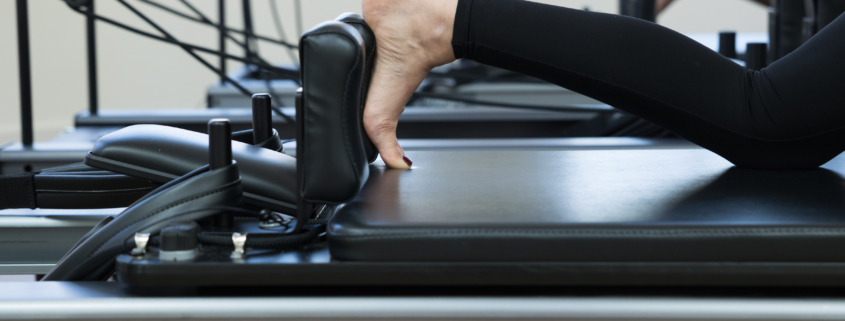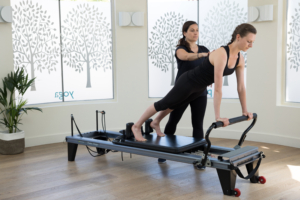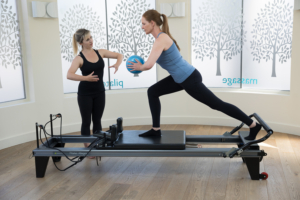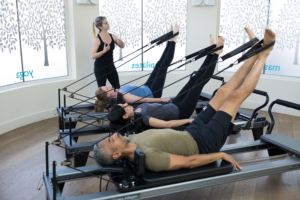Reformer Pilates: A complete explanation
Have you heard of Reformer Pilates or seen a Reformer machine but still feel in the dark about what happens in a Reformer class? We know it can look like a unusual and potentially daunting or advanced piece of equipment. While we wouldn’t recommend just jumping on it and seeing what happens, it’s a great piece of kit which can transform your Pilates practice and provide enormous benefits, regardless of your age, ability or level of experience. Joseph Pilates first began developing his exercise machines over 100 years ago when he attached springs to hospital beds so that patients could perform his exercises to rehabilitate and ‘return to health’. Read on for a complete explanation of everything Reformer…
What is Reformer Pilates?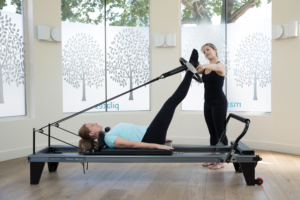
Reformer Pilates is carried out on a piece of equipment called a Reformer that has a bed section called a ‘carriage’ as well as springs, ropes and pulleys. It can look a little bit intimidating but don’t be put off. It’s actually a very useful, multi-functional piece of equipment that can make Pilates more accessible to many different populations. The springs attach to the carriage to provide weighted resistance or additional support depending on the focus of the exercise and needs of the client. You can add or take away springs to increase or decrease the resistance or support provided by the machine making Reformer Pilates incredibly versatile. The straps attached to the ropes can be held by the hands or feet to provide an almost endless variety of exercises specific to the reformer. A lot of exercises are performed lying down but we can also sit, kneel and stand on the carriage.
Who can use it?
Everyone! Reformer Pilates is accessible to all. The resistance springs on the Reformer allow your instructor to set up each exercise at the correct level for you while taking into account your age, goals, fitness level and injury history. Age or injury should never be a barrier! As the Reformer allows exercises in standing, lying, kneeling and seated positions with varying levels of support, resistance and exercise types, classes are accessible for all and we teach clients from late teens into the 80’s with many different injuries, needs and goals.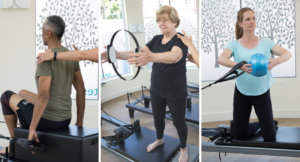
Pregnancy and post-natal clients can also benefit from Reformer Pilates with an instructor who is qualified to work with them. It can be an excellent way to prepare for birth and also to reconnect to our deep core muscles after birth. Our Physiotherapists and Pilates instructors often work together to help with patient rehabilitation as they can use targeted exercises which are very effective for specific injury rehabilitation. Our Physiotherapists also use the Reformer for specific Clinical Pilates rehab exercises as part of some Physiotherapy treatment plans.
What exercises can you do?
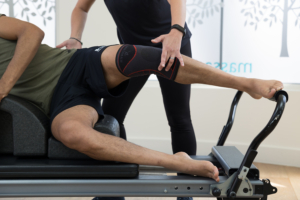 Reformer Pilates includes many of the same exercises you might do in a Mat class but with the addition of the resistance and support provided by the machine. You’ll perform pelvic bridges, chest lifts, planks, scissors, single and double leg stretch and many more you’ll recognise!
Reformer Pilates includes many of the same exercises you might do in a Mat class but with the addition of the resistance and support provided by the machine. You’ll perform pelvic bridges, chest lifts, planks, scissors, single and double leg stretch and many more you’ll recognise!
As well as the different dimensions and resistance the springs and ropes provide, there’s also a whole new range of exercises to explore including the favourite of many clients, ‘legs in straps’. Exercises can also be made very specific if doing rehab or wanting to focus on a particular area or concern. All sessions will be guided by your highly trained and experienced teacher so you will never be left alone to figure out what to do!
Benefits of using the Reformer
As with any Pilates class, the potential benefits are enormous – gaining control of your breathing, connecting mind and body, improving balance and flexibility, connecting deeply into the core muscles and strengthening the whole body. It’s a great option for regular strength training without impact as well as exercising whilst recovering from injuries. The settings of the reformer allow us to always be able to challenge the body to the next level for every individual so you’ll continually develop while never growing tired of your practice.
How our classes work
At reCentre we have two different types of class which use the Reformer:
1:1 Private Pilates
- This class is completely tailored to the individual, with just you and the teacher.
- Your teacher will consider your injury history, Pilates experience and goals to help design your individualised programme.
- Private classes allow you to incorporate Mat exercises and other Pilates apparatus such as the Wunda Chair,
which have additional benefits.
Suitable for: Beginners, rehabilitation, specific injuries, pregnancy and post-natal, those wanting 1:1 focused workouts and to advance their practice.
How to book: Head to our timetable and book all of your 1:1 sessions online. You can book a single class, try two initial sessions with our intro offer or purchase a package of six sessions at a discount.
3:1 Group Reformer Classes
- These classes include 3 students to 1 teacher and will take place entirely on the Reformer.
- Each student will have a Reformer for the duration of the class.
- Students will be led through the Reformer Pilates repertoire but with the benefit of a small class, you’ll have your instructor’s corrections and expertise at every stage.
- You’ll still be able to work at your own level and pace as the machine can be adjusted to support your personal practice needs.
Suitable for: Beginners to advanced, for regular Pilates Reformer practice and anyone wanting a full body workout
How to book: Head to our timetable and book all of your Group 3:1 sessions online. You can book single classes, try two classes with our intro offer or purchase a package at a discount
New to Pilates?
If you’re new to Pilates at reCentre we always recommend:
- Start with two 1:1 sessions: this will give you the best possible introduction to the Pilates method and to the equipment, guiding you through all the fundamentals of Pilates including breathing techniques, core activation and fundamental exercises, whilst working with your specific ability, goals and any injuries you have may. There really is no better way to start practicing Pilates.
Get discounts on your first two 1:1 sessions with our intro offers - Carry on with 1:1 sessions OR join any Group classes: If you have a specific injury or health concern you’re working with, we recommend staying with 1:1 sessions to ensure you get a completely tailored session working on your own specific goals until your teacher feels you’re ready for group classes. Otherwise, once you’ve completed your first two 1:1 sessions, you’ll have all the knowledge and skills you need to attend any of our 3:1 group classes or small group Mat classes if you’d prefer to develop your mat practice.
Get discounts on your first two 3:1 sessions with our intro offers
Happy practicing!

